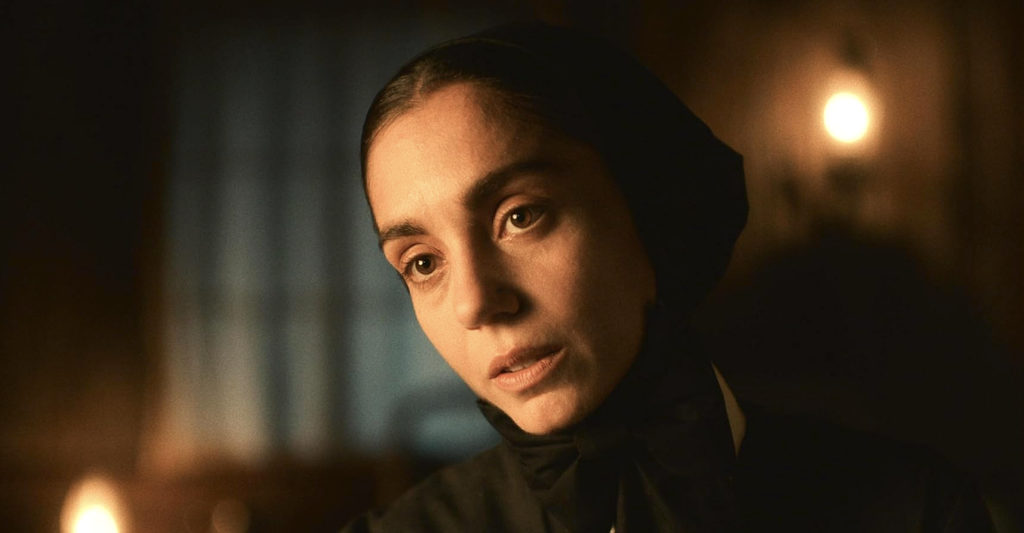Francesca Cabrini was born in Italy in 1850. After being rejected by three religious orders because of her “weak constitution,” she founded her own missionary congregation in Codogno, Italy. At the time, it was the only missionary order comprised solely of women.
In 1889, she and six of her Missionary Sisters set off for New York City. Over the course of 34 years she established an astonishing 67 hospitals, orphanages, and schools, mostly for Italian immigrants. She was canonized in 1946 by Pope Pius XII — the first American citizen to be named a saint — and was proclaimed patron saint of all immigrants.
The first biopic ever dedicated to the life of Mother Cabrini premieres in theaters on March 8, coinciding with International Women’s Day. It is brought to us from the director (Alejandro Monteverde), producers and writers of “Sound of Freedom,” the 2023 independent movie that grossed over $240 million worldwide.
With strong writing and directing, the film succeeds in depicting Cabrini — played by Italian actress Cristiana Dell’Anna — as a truly great woman in American history, one whose life and spirituality has plenty to say to the Catholic Church in the United States today.
“Cabrini” centers around the very beginning of her mission in New York City at the end of the 19th century, when the condition of Italian immigrants in most American cities was dire. The Italian neighborhood of Five Points in Lower Manhattan, where Cabrini established her first house, was plagued by disease and perhaps the highest murder rate recorded anywhere.
Most Italians lived in utter poverty and were denied basic rights, including access to hospital care. They were often the victims of racism and discrimination, called slurs like “dago” and “Guinea pigs.”
It was here that Cabrini found herself. And thankfully, “Cabrini” does not try to conceal its subject’s weakness.
As a child, Cabrini almost drowned, leaving her with serious lung damage that should have left her bedridden for the rest of her life. In one scene, we see her collapse from exhaustion a few days into her mission. A doctor gives her two, maximum three years to live.
In emphasizing Cabrini’s human shortcomings and weakness, the film presents a saint who didn’t accomplish great things because she was endowed with extraordinary willpower or unusual talents. Rather, we meet a woman who was convinced from the start that her mission, humanly speaking, was impossible. That she was bound to fail. Her success was based on her complete and utter trust in God.
In other words, it was precisely her weakness that made her more suitable for her mission.
As the movie shows, that trust led her to aim for the impossible. “The world is too small for what I intend to do,” she tells Pope Leo XIII (played by legendary Italian actor Giancarlo Giannini) in an early scene. This from a woman who was not supposed to leave her bed for the rest of her life!
Her drowning incident left her with a deep-seated terror of water, but this did not prevent her from crossing the Atlantic by boat some 30 times. In one scene, she quotes St. Paul: “I can do all things through him who strengthens me.”
“Do you want to be king?” an astonished Pope Leo asks her at the end of the movie. “Yes,” she replies, “I want to build an empire of hope.”
“Cabrini” invites us to do something strange, even radical: to rejoice in our weaknesses, our laziness, our lack of courage, our lack of natural talents because they make us more, not less, apt for the mission that God is entrusting us.
The second part of the film follows Cabrini’s struggles in New York City, where the local church and the mayor are opposed to her work. We see the saint overcome impossible odds to establish an orphanage, a house, and then a hospital.
Two other aspects of this saint’s character emerge in this part of the film. First, her absolute trust in divine providence. “Begin the mission and the means will come,” she repeats in several scenes.
The second is the insistence on freedom and love. Her missionary work consisted in presenting children with love, without asking them to change. “The wounds the children bear,” she says in one of the movie’s scenes, “are only healed through love, and through an education of the heart.”
Cabrini is often presented as a “social saint.” But the primary source of her vocation was the immersion in the tangible experience of the love of God.
“Let all your affections, O daughters, be concentrated in this beautiful Heart, and you will always and truly be happy,” she wrote to her sisters during one of her transatlantic voyages.
“But if, on the other hand, some private affection either to you or to creatures binds you, you will always have some annoyance, some hours of tedium and melancholy. … Put on your wings, I pray you.”
Missionary work was a natural consequence, almost a reflex, of this immersion in the love of God.
“We must from time to time dive into God, immerse ourselves in the salutary water of his grace and loving kindness, and then fly, that is, work with much vigor.”
“Cabrini” offers viewers a refreshing opportunity to think about the true meaning of our lives, the love of God, and the mission that he’s entrusted to those who are baptized — one that surpasses our strengths. The key to this mission, Cabrini’s life suggests, is to have a tangible, concrete experience of his love.
Cabrini says it best in the film: “You need to have the courage to be what God wants you to be.”

